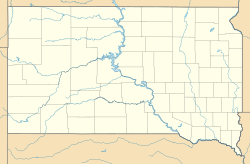Childstown Township Bridge Number S-15 facts for kids
Quick facts for kids |
|
|
Childstown Township Bridge Number S-15
|
|
| Location | 282nd St., Childstown Township, Turner County, South Dakota |
|---|---|
| Area | less than one acre |
| Built | 1940 |
| Built by | Turner County Highway Department; Works Progress Administration |
| Architectural style | Stone arch |
| MPS | Stone Arch Culverts in Turner County, South Dakota MPS |
| NRHP reference No. | 00001217 |
| Added to NRHP | October 30, 2000 |
The Childstown Township Bridge Number S-15 is a special old bridge. It crosses a small stream on 282nd Street in the countryside of Turner County, South Dakota. This bridge was built in 1940. It is one of many bridges in the area that got funding from a big government program called the New Deal. Because it's so important to history, it was added to the National Register of Historic Places in the year 2000.
What is the Childstown Bridge?
The Childstown Township Bridge Number S-15 is found in the western part of Turner County. It's about 6 miles (10 km) west of a town called Hurley. This bridge helps 282nd Street, which is a dirt road, cross a small stream.
How the Bridge Looks
This bridge is a small structure made of stone. It has a single arch, which is like a curved doorway, about 6 feet (1.8 m) long. Above the arch, on each side, there's a stone wall called a headwall. This wall rises about 1 foot (0.3 m) above the arch. Angled walls, called wing walls, extend out from the main structure.
The bridge is built using local stones. These stones are mostly granite and gneiss, which are types of fieldstone. You can see a metal plate on top of the arch. It says "WPA 4422". This shows that the bridge was built with help from the Works Progress Administration (WPA).
Why This Bridge is Special
This bridge is one of about 180 stone arch bridges built in Turner County. They were all part of a federal jobs program during the New Deal era. The New Deal was a plan by the United States government in the 1930s. It helped people find jobs during a very difficult time called the Great Depression.
Building stone bridges was cheaper than using steel beams back then. This was because many skilled stone workers were available. The government also helped pay their wages. Local county leaders supervised the workers. They also provided all the building materials. This particular bridge was built in 1940 by a county team. They followed a standard design from the state.



